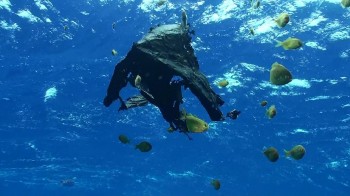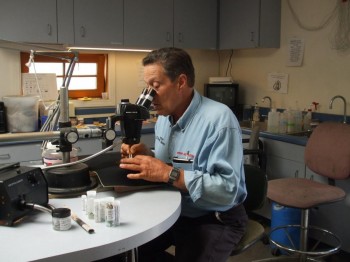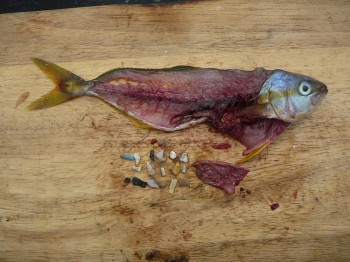
A variety of ocean fish swim alongside a plastic bag polluting the water as it is carried along by a current in the Pacific Ocean. Photo courtesy of Algalita Marine Research Foundation of Long Beach.
9:34am | An alarming number of fish in the Pacific Ocean routinely consume tiny pieces of plastic that they mistake for plankton and other natural food sources, according to the findings of a recent study that was released to the public Friday.
The new research indicates possible widespread ingestion of plastic by fish in the world’s oceans, a finding that could prove troubling to the marine food chain and the world’s commercial fisheries, researchers with the Algalita Marine Research Foundation of Long Beach said.
Algalita researchers found that 35 percent of the fish it tested on a trip to the Pacific had ingested small pieces of plastic. The analyzed fish are considered “feeder” fish in the ocean food chain, suggesting that larger fish and marine life could possibly be ingesting plastic, as well, by consuming these smaller fish.
“This is alarming both because of how many fish with plastic particles we found, and because of what we don’t know,” said Bill Francis, Algalita president. “What we don’t know is whether plastic — and the multitude of chemicals within plastic — remains in the food chain that ultimately ends up on our plates.
Francis said that the foundation’s research is particularly timely, because “more and more scientific studies are indicating bigger problems with plastic and the leaching of toxic chemicals.”
Long Beach Vice Mayor Suja Lowenthal was on hand and called on the world’s mayors and community leaders to take aggressive steps to stem the flow of plastic into the environment.
“Sadly, the ocean has become the world’s dumping ground, and it must stop,” Lowenthal said, adding that Long Beach spends about $2 million a year to clean up the piles of plastic and trash flowing into its harbor and onto beaches after storms.
“I am very encouraged by the youth of our world to take action, but we all must take steps. Cities, towns, villages and communities in all countries must contain plastic and keep it from entering our environment,” she continued. “Plastic pollution is harmful to our health and our pocketbooks.”
Algalita’s latest study is among a body of research being conducted by the Foundation to determine the extent of plastic pollution in the world’s oceans. The locally-based foundation is responsible for discovering what has since been dubbed the “Great Pacific Garbage Patch.” Found in the North Pacific Ocean, the patch, also known as the Pacific Trash Vortex, is a large floating mass of pollutants, including pelagic plastics, chemical sludge and other debris, that has been estimated to be as large as the continental United States and small as about twice the size of Texas.
“The simple fact is this: Tons of plastic are floating in our oceans,” said Capt. Charles Moore, Algalita’s founder and lead researcher. “It breaks down into smaller pieces, and these pieces do not go away. Now, we are finding that these plastic bits are mistaken by fish and bird for food. “I wish I could tell you that the outlook for plastic pollution is improving — but it’s not,” Moore said.
Algalita’s latest research will be formally presented to a large gathering of scientists at the Marine Debris Conference organized by the United Nations and the National Oceanic and Atmospheric Administration in Hawaii later this month.
Friday also marked the kickoff of Algalita’s 2011 Plastics are Forever International Youth Summit. More than 100 selected students and their advisers from 12 different countries are participating in the summit, where they are being immersed in a comprehensive educational program designed to engage, mentor and activate young leaders as they develop and launch action-oriented solutions to reduce plastic waste in their home communities.
The student teams selected to attend were chosen from among a group of 74 teams representing 18 countries. While the summit’s focus is on plastic pollution in the marine environment, some participating students are also dealing with the negative impacts of plastic pollution on inland animals and wildlife, such as in Kenya and India.
For additional information on the summit, visit Plasticsareforever.org, and be sure to check out the video below.
Video courtesy of Algalita Marine Research Foundation of Long Beach.

Capt. Charles Moore, Algalita’s founder and lead researcher, reviews samples under a microscope in his laboratory. Photo courtesy of Algalita Marine Research Foundation of Long Beach.

Almost 20 different plastic fragments were discovered in the digestive track of this rainbow runner. A new study reveals the potentially widespread ingestion of bits of plastic by fish stemming from pollution in the Pacific Ocean. Photo courtesy of Algalita Marine Research Foundation of Long Beach.

